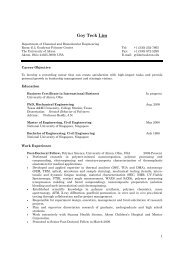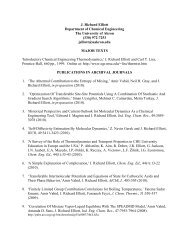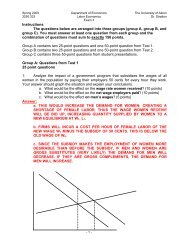Sociology of the Anarchists - Gozips.uakron.edu - The University of ...
Sociology of the Anarchists - Gozips.uakron.edu - The University of ...
Sociology of the Anarchists - Gozips.uakron.edu - The University of ...
You also want an ePaper? Increase the reach of your titles
YUMPU automatically turns print PDFs into web optimized ePapers that Google loves.
North American Anarchist Movement and Weber's Three Types <strong>of</strong><br />
Authority 47<br />
Max Weber wrote during a high point for anarchism, in both <strong>the</strong> US and Europe.<br />
Although he surely would have known about it – <strong>the</strong> press ran well-funded propaganda<br />
campaigns against it for decades (Hong 1992) – he doesn’t seem to have taken it into<br />
account in his scheme. Had he, it might have caused him to create ano<strong>the</strong>r category <strong>of</strong><br />
authority.<br />
<strong>The</strong> anarchist reaction to various kinds <strong>of</strong> authority is fundamental. Simply, anarchism<br />
opposes any authority that is placed above <strong>the</strong> individual and collective interest. More<br />
specifically, anarchism rejects <strong>the</strong> authority <strong>of</strong> any idea or institution that supports itself<br />
merely on <strong>the</strong> merit <strong>of</strong> being “tradition”. As such, anarchists were early critics <strong>of</strong><br />
industrial capitalism and advocates <strong>of</strong> women’s rights (including suffrage). Anarchism<br />
likewise rejects charismatic leadership as <strong>the</strong> kind that frequently leads to despotism or<br />
reformism (various “socialist” and liberal leaders are usually <strong>the</strong> primary examples<br />
<strong>of</strong>fered). However, anarchism has an ambiguous understanding <strong>of</strong> “leadership” itself. For<br />
instance, Crass (2001) points towards leaders who work to create “group-centered<br />
leadership” (as SNCC's Ella Baker did), as opposed to “individual-centered leadership”,<br />
thus circumventing <strong>the</strong> potential <strong>of</strong> manipulation and power-grab <strong>of</strong> individuals and thus<br />
diffusing power. Finally, anarchists reject legal-rational authority since its power is<br />
lodged within <strong>the</strong> confines <strong>of</strong> <strong>the</strong> State, which is bureaucratic (as Weber pointed out) and<br />
hierarchical. Anarchism claims that laws are made and enforced to protect <strong>the</strong> few and <strong>the</strong><br />
expense <strong>of</strong> <strong>the</strong> many. Like Marx, <strong>the</strong>y view <strong>the</strong> legal and political system as a tool <strong>of</strong> <strong>the</strong><br />
bourgeoisie class.<br />
By mere definition, <strong>the</strong> North American anarchist movement itself adheres to none <strong>of</strong><br />
Weber’s authority types. At its core, anarchism is explicitly anti-authoritarian. According<br />
to George, “<strong>The</strong> fundamental principle <strong>of</strong> Anarchism is <strong>the</strong> rejection <strong>of</strong> authority, with <strong>the</strong><br />
possible exception <strong>of</strong> ‘natural authority’” (George 1997, p. 55). Or, as <strong>the</strong> anarcho-punk<br />
band Crass put it: “<strong>the</strong>re is no authority but yourself” – a sentiment that obviously<br />
contradicts authority, which must be over o<strong>the</strong>rs.<br />
Although anarchism itself does not possess any <strong>of</strong> Weber’s three authority types, it is not<br />
immune from norms. In fact, Spencer seems to suggest that norms are ra<strong>the</strong>r compatible<br />
to anarchism, albeit informal norms: “Norms are rules <strong>of</strong> conduct towards which actors<br />
orient <strong>the</strong>ir behaviour” (Spencer 1970, p. 124). As such, <strong>the</strong>re are many unwritten rules or<br />
norms that anarchists follow, norms which do closely sync with Weber’s authority types.<br />
“Traditionally-legitimated norms” – rules with historic legitimacy and precedent – are<br />
found in anarchist predilection for specific types <strong>of</strong> organizing, such as <strong>the</strong> use <strong>of</strong> affinity<br />
groups, a practice common since its popularized usage in <strong>the</strong> Spanish Civil War <strong>of</strong> <strong>the</strong><br />
1930s. Customs, such as <strong>the</strong> use <strong>of</strong> <strong>the</strong> “circle-A” symbol as an identifier, and parlance<br />
(terms like “liberatory”, “direct action”, and “mutual aid” in particular), have been used<br />
for a long period in anarchist culture.<br />
47 This section was originally submitted as part <strong>of</strong> a paper for a course entitled “Sociological <strong>The</strong>ory” at<br />
<strong>the</strong> <strong>University</strong> <strong>of</strong> Akron, Fall 2003.<br />
[ Williams 52 ] [ this is a draft. do not cite. ]






